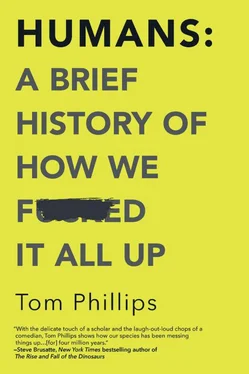Tom Phillips - Humans - A Brief History of How We F*cked It All Up
Здесь есть возможность читать онлайн «Tom Phillips - Humans - A Brief History of How We F*cked It All Up» весь текст электронной книги совершенно бесплатно (целиком полную версию без сокращений). В некоторых случаях можно слушать аудио, скачать через торрент в формате fb2 и присутствует краткое содержание. Город: Toronto, Год выпуска: 2019, ISBN: 2019, Издательство: Hanover Square Press, Жанр: История, Юмористические книги, на английском языке. Описание произведения, (предисловие) а так же отзывы посетителей доступны на портале библиотеки ЛибКат.
- Название:Humans: A Brief History of How We F*cked It All Up
- Автор:
- Издательство:Hanover Square Press
- Жанр:
- Год:2019
- Город:Toronto
- ISBN:978-1-48805-113-5
- Рейтинг книги:4 / 5. Голосов: 1
-
Избранное:Добавить в избранное
- Отзывы:
-
Ваша оценка:
- 80
- 1
- 2
- 3
- 4
- 5
Humans: A Brief History of How We F*cked It All Up: краткое содержание, описание и аннотация
Предлагаем к чтению аннотацию, описание, краткое содержание или предисловие (зависит от того, что написал сам автор книги «Humans: A Brief History of How We F*cked It All Up»). Если вы не нашли необходимую информацию о книге — напишите в комментариях, мы постараемся отыскать её.
Humans: A Brief History of How We F*cked It All Up — читать онлайн бесплатно полную книгу (весь текст) целиком
Ниже представлен текст книги, разбитый по страницам. Система сохранения места последней прочитанной страницы, позволяет с удобством читать онлайн бесплатно книгу «Humans: A Brief History of How We F*cked It All Up», без необходимости каждый раз заново искать на чём Вы остановились. Поставьте закладку, и сможете в любой момент перейти на страницу, на которой закончили чтение.
Интервал:
Закладка:
There’s even some evidence that, in certain circumstances, the very act of telling people they’re wrong—even if you patiently show them the evidence that clearly demonstrates why this is the case—can actually make them believe the wrong thing more . Faced with what they perceive as opposition, they double down and entrench their beliefs even more strongly. This is why arguing with your racist uncle on Facebook, or deciding to go into journalism, may be an ultimately doomed venture that will only leave you despondent and make everybody else very angry with you.
None of this means that people can never make sensible and well-informed decisions: very obviously they can. I mean, you’re reading this book, after all. Congratulations, you excellent choice-maker! It’s just that our brains often put a remarkably large number of obstacles in the way, all the time thinking they’re being helpful.
Of course, if we’re bad at making decisions on our own, it can get even worse when we make decisions along with other people. We’re a social animal, and we reeeaaalllly don’t like the feeling of being the odd one out in a group. Which is why we frequently go against all our better instincts in an effort to fit in.
That’s why we get groupthink—when the dominant idea in a group overwhelms all the others, dissent being dismissed or never voiced thanks to the social pressure to not be the one saying, “Uh, I’m not sure this is the greatest idea?” It’s also why we jump on bandwagons with wild abandon: the very act of seeing other people do or believe a thing increases our desire to match them, to be part of the crowd. When your mum asked you as a kid, “Oh, and if the other kids jumped off a bridge, would you do that, too?” the honest answer was, “Actually, there’s a pretty good chance, yeah.”
And finally, there’s the fact that—bluntly—we think we’re pretty great when we are not, in fact, all that. Call it hubris, call it arrogance, call it being a bit of a pillock: research shows that we wildly overestimate our own competence. If you ask a group of students to predict how high up the class they’ll finish, the overwhelming majority will put themselves in the top 20 percent. Hardly any will say, “Oh yeah, I’m probably below average.” (The most common answer is actually outside the top 10 percent, but inside the top 20 percent, like a boastful version of ordering the second-cheapest glass of wine.)
There’s a well-known cognitive problem called the Dunning–Kruger effect, and beyond sounding like an excellent name for a seventies prog rock band, it may be the patron saint of this book. First described by the psychologists David Dunning and Justin Kruger in their paper “Unskilled and Unaware of It: How Difficulties in Recognizing One’s Own Incompetence Lead to Inflated Self-Assessments,” it provides evidence for something that every one of us can recognize from our own lives. People who are actually good at any particular skill tend to be modest about their own abilities; meanwhile, people with no skills or talent in the field wildly overestimate their own competence at it. We literally don’t know enough about our own failings to recognize how bad we are at them. And so we blunder on, overconfident and blissfully optimistic about whatever it is we’re about to get horribly, horribly wrong. (As the rest of this book will show, of all the mistakes our brains make, “confidence” and “optimism” may well be the most dangerous.)
All of these cognitive failures, piled one on top of the other in the form of society, lead us to make the same types of mistakes over and over again. Below are just a few of them: think of this like a spotter’s guide for the rest of the book.
For starters, our desire to understand the world and discern patterns in it means that we spend quite a lot of our time convincing ourselves that the world works a certain way when in fact it absolutely doesn’t work like that. This can encompass everything from small personal superstitions to completely inaccurate scientific theories, and explains why we fall for propaganda and “fake news” so readily. The real fun starts when somebody manages to convince large numbers of other people that their pet theory about how the world works is true, which gives you religion and ideology and all those other Big Ideas that have proved so entertaining over the course of human history.
Humans are also very bad at risk assessment and planning ahead. That’s partly because the art of prediction is notoriously difficult, especially if you’re trying to make predictions about a highly complex system, like the weather or financial markets or human society. But it’s also because once we’ve imagined a possible future that pleases us in some way (often because it fits with our preexisting beliefs), we’ll cheerfully ignore any contrary evidence and refuse to listen to anybody who suggests we might be wrong.
One of the strongest motivators for this kind of wishful-thinking approach to planning is, of course, greed. The prospect of quick riches is one that’s guaranteed to make people lose all sense—it turns out we’re very bad at doing a cost–benefit analysis when the lure of the benefit is too strong. Not only will humans cross oceans and climb mountains for the (often fanciful) promise of wealth, we’ll also happily cast aside any notion of morality or propriety as we do it.
Greed and selfishness also play into another common mistake: that of us collectively ruining things for everybody because we each wanted to get an advantage for ourselves. In social science, this category of screw-ups goes by names like the “social trap” or the “tragedy of the commons,” which is basically when a group of people all do things that on their own would be absolutely fine in the short term, but when lots of people do them together, it all goes horribly wrong in the long term. Often this means destroying a shared resource because we exploit it too much: for example, fishing an area of water so much the fish stocks can’t replenish themselves. There’s also a related concept in economics known as a “negative externality”—basically a transaction where both parties do well out of it, but there’s a cost that’s paid elsewhere, by someone who wasn’t even part of the transaction. Pollution is the classic example of that; if you buy something from a factory, that’s a win for both you and the manufacturer, but it might be a loss for the people who live downstream of the toxic waste the factory pours out.
This group of related mistakes are behind a really large proportion of human fuck-ups—in systems from capitalism to cooperatives, and from issues that can be as vast as climate change or as small as splitting the bill in a restaurant. We know that it’s a bad idea for everyone to underplay how much they owe, but if everyone else is doing it, we don’t want to be the ones to lose out by not doing it. And so we shrug, and say, “Not my problem, mate.”
Another one of our most common mistakes is prejudice: our tendency to split the world into “us” and “them” and quickly believe the worst thing possible about whoever “them” is. This is where all our cognitive biases get together and have a bigotry party: we divide the world up according to patterns that might not exist, we make snap judgments based on the first thing to come to mind, we cherry-pick evidence that backs up our beliefs, we desperately try to fit into groups and we confidently believe in our own superiority for no particularly good reason.
(This is reflected in the book in more ways than one: while this is a history of humanity’s failures, with a couple of exceptions it’s really a history of failures by men; and more often than not, white men. That’s because they were often the only ones who were given the chance to fail. Generally it’s not a good thing for history books to focus almost exclusively on the deeds of old white guys, but given the subject matter of this one, I think it’s probably a fair cop.)
Читать дальшеИнтервал:
Закладка:
Похожие книги на «Humans: A Brief History of How We F*cked It All Up»
Представляем Вашему вниманию похожие книги на «Humans: A Brief History of How We F*cked It All Up» списком для выбора. Мы отобрали схожую по названию и смыслу литературу в надежде предоставить читателям больше вариантов отыскать новые, интересные, ещё непрочитанные произведения.
Обсуждение, отзывы о книге «Humans: A Brief History of How We F*cked It All Up» и просто собственные мнения читателей. Оставьте ваши комментарии, напишите, что Вы думаете о произведении, его смысле или главных героях. Укажите что конкретно понравилось, а что нет, и почему Вы так считаете.












